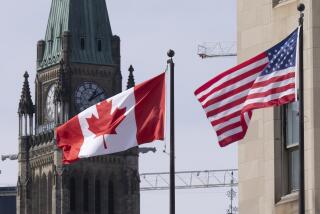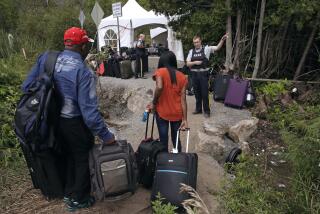WHO asks Canada to justify restricting travel from Ebola zone

- Share via
The World Health Organization is asking Canada to justify its decision to restrict travel from the West African nations hardest hit by Ebola.
The Canadian government announced Friday that it would no longer issue travel visas or process permanent residency applications for people from the countries with “widespread and persistent-intense transmission.”
The move puts Canada at odds with the World Health Organization, which has repeatedly urged countries not to prohibit travel to and from Ebola-affected countries, including Liberia, Sierra Leone and Guinea.
WHO officials argue that such measures are counterproductive because they complicate efforts to deploy relief workers and supplies, and because they might encourage affected countries and individuals to conceal the disease.
International Health Regulations agreed to by Canada stipulate that countries that impose travel and trade restrictions that go over and above measures recommended by the WHO should provide a public health rationale that is based on science, WHO officials say.
“Any strong measures [like border closures] need to be well documented and explained to those who are suffering from those measures,” the WHO’s Dr. Isabelle Nuttall said in an interview Tuesday with the Canadian Press news agency.
“If not, they will just be circumvented. People will find a way to travel. And the consequence to a country might be even worse than not having had a travel ban.”
Nuttall said she had asked the Public Health Agency of Canada for an explanation. The agency told the Canadian Press that it would respond to the WHO’s request “in the near future.”
Canadian officials say the travel ban does not apply to Canadian nationals, who will continue to be screened for Ebola at ports of entry along with visitors from countries that do not require visas. Exceptions can also be made for essential travel by citizens of other countries, they say.
The “No. 1 priority is to protect Canadians,” Health Minister Rona Ambrose said in a statement last week.
Australia announced similar restrictions last week, a decision that was criticized by the WHO. There have also been calls for the United States to do the same, but federal officials have so far resisted imposing an outright ban.
Instead, airline passengers from Liberia, Sierra Leone and Guinea are required to fly into one of five U.S. airports that screen for Ebola -- Washington Dulles; O’Hare International in Chicago; John F. Kennedy International in New York; Hartsfield-Jackson International in Atlanta; and Newark Liberty International in New Jersey. State authorities have imposed a patchwork of strategies to monitor those travelers deemed at risk of exposure, including in some cases mandatory quarantines.
More than 13,000 confirmed and suspected Ebola cases have been reported to the WHO in the current outbreak, the largest on record, according to figures released Wednesday. They include more than 4,800 deaths.
Canada has not had a case of the virus.
For more international news, follow @alexzavis on Twitter.
More to Read
Sign up for Essential California
The most important California stories and recommendations in your inbox every morning.
You may occasionally receive promotional content from the Los Angeles Times.











